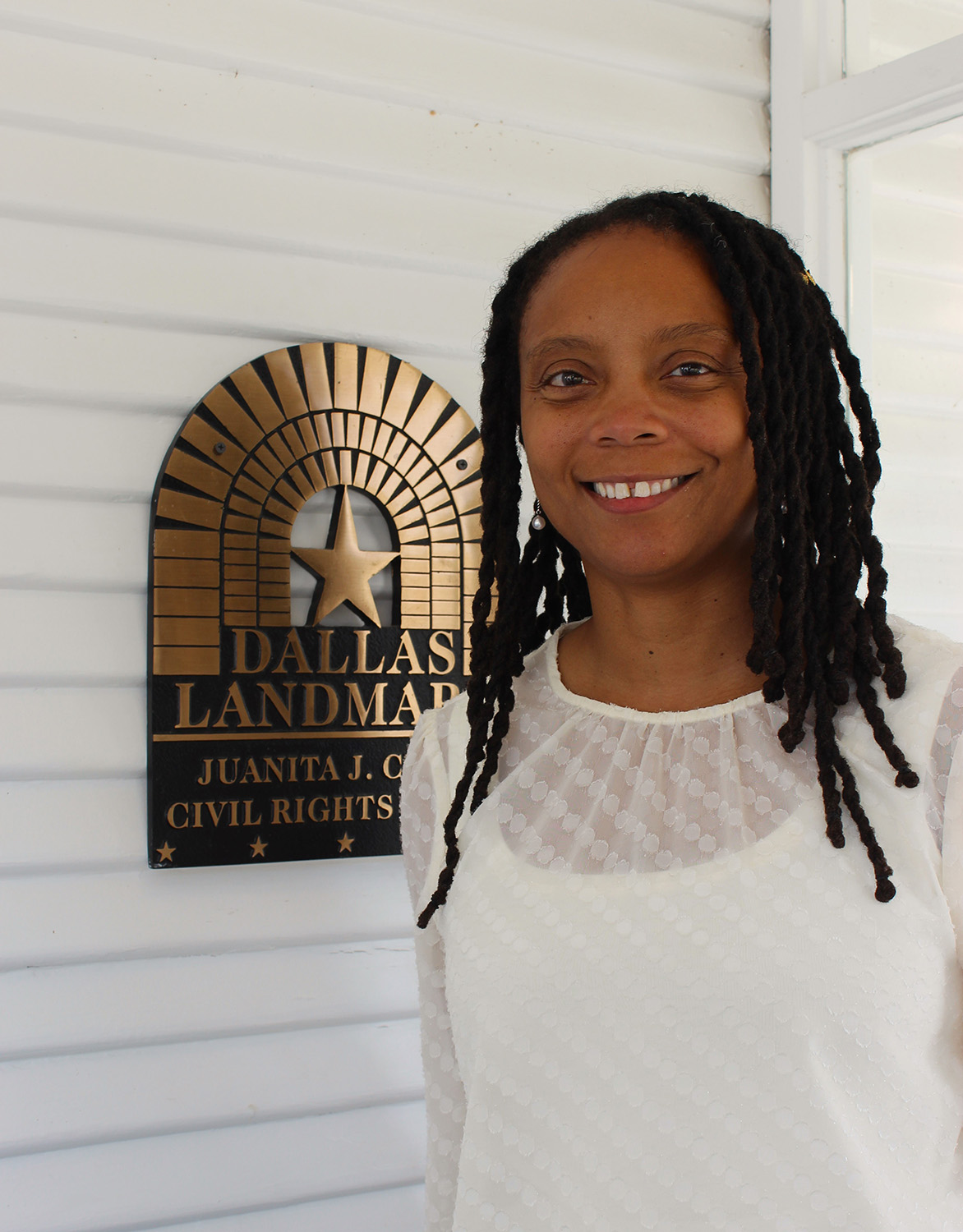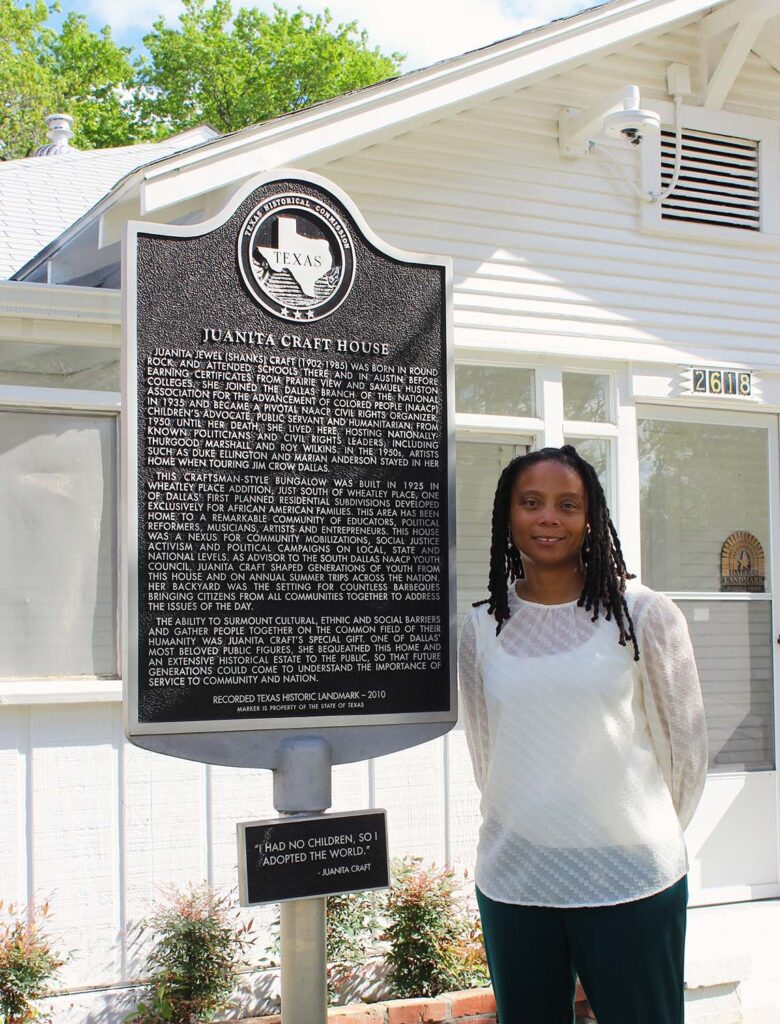Story and photos by Nancy McGuire. Video by Angelica Villa.

Candace Thompson, director of the Friends of the Juanita J. Craft Civil Rights Home and Museum, says that one of her greatest accomplishments is to see the house restored, and “to know that Ms. Craft’s legacy is living on and becoming a household name in Dallas and across the state as well.” The museum now hosts many historic possessions of Ms. Craft, such as her stove, dinner table, telephone, record player, and clothing. It also provides an overview of the nation’s leaders who visited during this time.
Kendall Ferguson, the Community Engagement Coordinator, emphasizes the significance of recognizing the behind-the-scenes efforts during the Civil Rights Movement. “I wish that everyone knew just how hard Mrs. Craft and other women worked behind the scenes during the Civil Rights Movement. When people come here, I not only bring awareness to the work she did but to all of the hundreds of thousands of women who were working behind the scenes to make progress happen,” she explains.
Kendall also highlights the importance of the museum as an accessible place for learning about history and the impact of Juanita Craft’s work. “It is a safe place to really learn about the history and the work that this incredible woman did to advance human rights. I think that is what she always wanted this place to be—a place where people from all backgrounds would feel safe asking questions and being in discussion about how to advance humanity.”
Born the granddaughter of slaves in 1902, Juanita Shanks Craft was raised by parents who had become school teachers, according to information at the Juanita J. Craft Museum. When she was in her early teens, her mother died from tuberculosis as there were no TB treatment facilities available to blacks. Shortly after, she and her father moved to the small town of Columbus, Texas, where Craft graduated from high school and went on to attend Prairie View A&M and Huston-Tillotson University, where she graduated with an education degree. Craft struggled to find work as a teacher and settled on becoming a housekeeper at the historic Adolphus Hotel, as well as a seamstress in her new hometown of Dallas. In her job at the hotel, Mrs. Craft had the occasion to meet many famous guests, including First Lady Eleanor Roosevelt, who encouraged Craft “to be all she could be” and to engage in political activism. Her work experiences helped open her eyes to the reality of inequality in America. This deeply affected her and set her off on a journey to fight for the integration of public institutions and equal rights for all.
In 1935, she joined the local chapter of the NAACP, becoming membership chair and eventually a field organizer of other chapters throughout the state of Texas. Her work with the NAACP youth program in Dallas became a model for other chapters nationwide. Her work with the NAACP was later acknowledged by Supreme Court Justice Thurgood Marshall, who said, “What the NAACP accomplished in Texas could not have transpired without her.”
According to the City of Dallas Office of Arts & Culture, Juanita Craft holds the distinction of being the first black woman to vote in a public election in Dallas County in 1944. The 1950s and 1960s served as the height of her political activism. She led protests against the segregation of schools, the public transportation system, movie theaters, and other public facilities. She even led a protest against the Texas State Fair for restricting black attendance on any other day than “Negro Day.” She was tireless and fearless in her pursuits to open Dallas intuitions to all races. At the age of 73, Craft was elected as a member of the Dallas City Council, where she served two terms. She won many civic and humanitarian awards, including the prestigious Linz Award as well as the Eleanor Roosevelt Award, who she had met many years before working at the Adolphus Hotel. The Juanita Craft Recreation Center was dedicated in her honor by the City of Dallas, as well as the adjoining park, which, at one time, was off-limits to blacks.
As one of the first African American residents in the Wheatley Place neighborhood, Mrs. Craft’s home became a staging ground for many of the political and civic activities she organized. Visited by such famous luminaries as Martin Luther King, Jr. and President Lyndon B. Johnson, the small house on Warren Street was a beacon to all the great civil activists of her time. Upon her death in 1985, Mrs. Craft willed her home to the City of Dallas for civic use, where people of all backgrounds can visit and learn how to be change-makers as Mrs. Craft was. The home is now listed on the National Register of Historic Places and is a Texas Historic Landmark property.
Operated as a historical site, the City of Dallas, along with the Friends of Juanita J Craft Civil Rights House and Museum, was in the process of turning the home into a museum when a pipe burst in 2018, severely damaging it. The Junior League of Dallas recognized the home’s historical importance and Mrs. Craft’s legacy. It coalesced a group of organizations to raise funds to restore the home and add a memorial garden to the property.

Candance and Kendall are committed to keeping the Craft legacy alive. Currently, the home now hosts school groups and community organizations as well as all those who want to learn about the civil rights movement in Dallas, and specifically, about the impact of Juanita J. Craft. Both women have a bigger vision for the home. They hope to work with other civil rights museums to expand programming and extend their reach to a wider audience. Candace sees the home as a spoke that extends beyond the community to foster more long-term and sustainable projects including being an integral stop on the Civil Rights Trail.
“The Craft home is a jewel for the city. We exist to make Mrs. Craft’s request a reality when she spoke the words: ‘It is my hope that after I am gone, people of all backgrounds will visit my house and come to understand that individuals can make a difference’” Candace says.
Kendall added that she believes that Mrs. Crafts’s legacy deserves to be elevated and amplified. She says her home serves as a place to learn about what this one woman did to advance civil rights in Dallas.
Docent-led tours of the home are coordinated through Kendall Ferguson at kendall.ferguson@dallas.gov. You can also visit the website to learn more.
Sign up with your email address to receive good stories, events, and volunteer opportunities in your inbox.